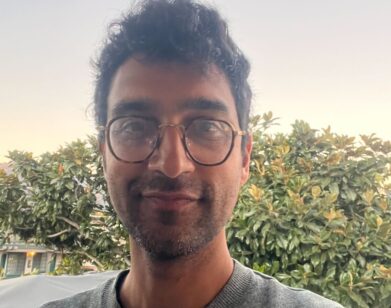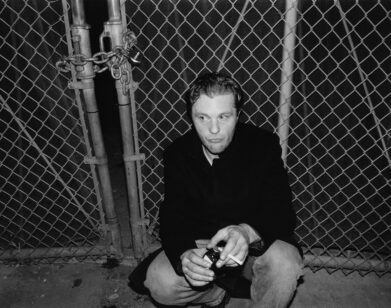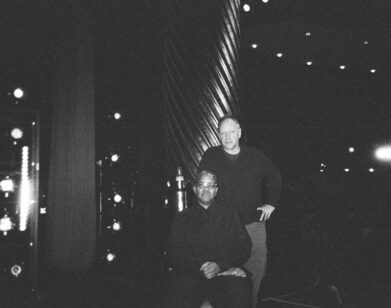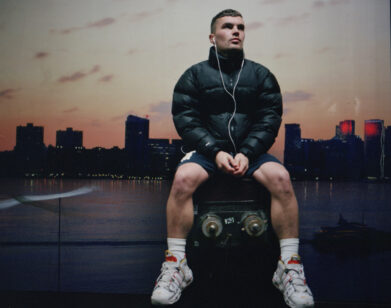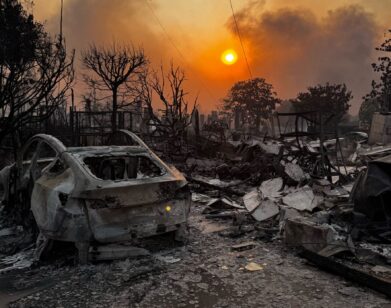Lily Rabe’s Master Class
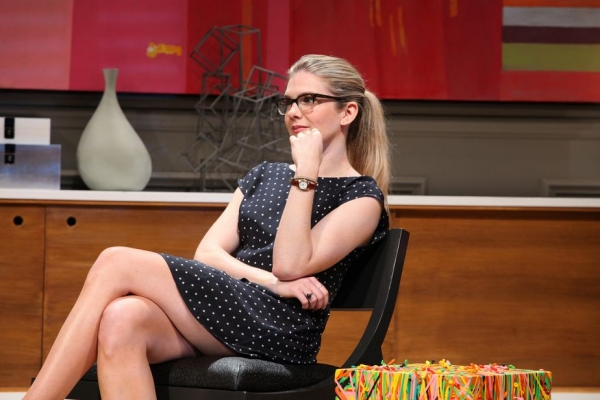
ABOVE: LILY RABE IN SEMINAR. PHOTO COURTESY OF JEREMY DANIEL
Theresa Rebeck’s ferociously funny new Broadway play, Seminar, which follows four aspiring fiction writers and the grumpy ex-novelist (played with just a touch of the Snape by Alan Rickman) they commission to lead their writing seminar, has teeth: its most memorable exchanges involve characters eviscerating one another through the guise of fiction critique. But it also has heart, centered mostly in the character of Kate, one of the students, whose stories riff on Austen and who hosts the weekly seminar at her family’s expansive rent-controlled apartment (and is, of course, embarrassed about it). Kate, an ugly duckling who doesn’t realize she’s become a swan, is both graceful and awkward, and is played with aplomb by Lily Rabe, daughter of David (and Jill Clayburgh), who recently won acclaim—and a Tony nom—for her role as Portia opposite Al Pacino in the Shakespeare in the Park production of The Merchant of Venice, which continued onto Broadway.
After Portia, Kate is a bit of a departure—her neuroses (about feminism, her sexuality, her inherited wealth, her ambition) are entirely modern, and so, as Rabe points out, is her wardrobe. In anticipation of the play’s opening November 20, Rabe took time out from her schedule of jetting back and forth between New York and Los Angeles (where she has a role in the Ryan Murphy FX show American Horror Story) to discuss her character, creative writing, and that commute.
ALEXANDRIA SYMONDS: I really enjoyed the play. What were your first thoughts when you read the script?
LILY RABE: Theresa [Rebeck]’s writing is so scarily funny. I just love how unapologetic she is with her writing: she doesn’t try to make her characters likeable or heroic, she just really makes them human. Hopefully, the audience is able to love them in the end—or have whatever feelings that they want to have about all of them—but I love that she doesn’t have that agenda. That is something that, as an actress, was really appealing to me; to just get to be in this group of people who are complicated and very human. They’re all making a lot mistakes and just trying to muck through as best they can. As someone who’s been doing a lot of classical theater recently, I loved the idea of getting to run around in Steven Alan, and not be in a corset and a wig, and not have a dialect, and get to be in a 90-minute play with no intermission, and get to do real comedy. Even though, to me, the play has so much weight also. Another big, big pull for me was [director] Sam Gold; Sam and I did a production of A Doll’s House this summer together, and I love working with Sam so much, so the idea of getting to work with him again on something so completely different was also a big pull for me. And the other actors involved.
SYMONDS: It’s such a physical role as well. Obviously Theresa knows how to write dialogue, and her dialogue is really funny.
RABE: She sure does.
SYMONDS: But a lot of the funniest moments in the play are physical, like when you come out of the wings with a mixing bowl and eat cookie dough straight from it. I’m curious—you’re in really good shape, but Kate’s eating all the time and making asides about not being hot, and it seems like she’s an iteration of the classic super-pretty girl who doesn’t know she’s pretty. What’s it like to play that?
RABE: Thank you so much, first of all. Yeah, I think that she is one of those girls—she’s just been so buried in books and she doesn’t really have a total sense of herself as a woman yet. Izzy [her seminar classmate] is someone who is so sort of comfortable with her sexuality and wears it on her sleeve. I think that’s the thing that [Kate] feels she doesn’t have. She just doesn’t have a sense of herself like that as a woman, completely.
SYMONDS: She is, though, a really unapologetic feminist; it seems like a lot of her troubles with Leonard seem to stem from their clashing ideas about gender politics. Is that something that you had in common with the character?
RABE: No, I’m not feminist. [laughs] I’m not, not a feminist. I agree with all of Kate’s points, I don’t think that she has a feminist agenda, I think just feels that is very important to be recognized and treated just like the boys in the class, and she’s right. Leonard does say a lot of things that would make her feel like he can’t sort of see her as—whether he’s aware that he’s saying them or not—he’s not taking her seriously in the way that she wants to and should be taken seriously, I think. Whether [or not] she’s the greatest writer in the world, she’s very smart. I think it’s an interesting thing, what you were saying, because I think she does have a very strong sense of herself intellectually, but [not with her] sexuality. I think she was a late bloomer, so she’s in her shell, and she keeps her glasses on, she’s hiding behind some of that stuff because I think she’s afraid of it. I think both her relationship with Leonard and Martin, and with her writing, sort of help her come out of that shell a little bit. I think she’s very self-aware in some ways, but like you said, she’s so self-deprecating and doesn’t identify herself as a sexual being.
SYMONDS: I know you’ve probably had some exposure to the world of very successful writers because of your father, but did you spend anytime immersing yourself in the milieu of the play—the really hard-core, neurotic, career-wannabe writers?
RABE: Yes! We all kind of did. We all got dorked out on passing around articles. Also, I have a lot of friends from both high school and college who are freelance journalists, or in grad school, or struggling fiction writers, so I have this kind of amazing resource material, [laughs] just in my address book, of some of my closest, closest friends.
SYMONDS: I’m sure.
RABE: Also, when I was in high school and college, my other real focus was, actually, fiction writing. So in college, I had done all these seminars with these various writers-in-residence.
SYMONDS: I hope none of them were as bad as Leonard. [laughs]
RABE: None of them were quite like Leonard, though I did have a ballet instructor who reminds me a lot of Leonard. His name was Dieter, and I thought of him often.
SYMONDS: Teutonic name, Dieter. [laughs]
RABE: Dieter. I know, it’s a perfect name. I did have wonderful things to draw from, from my own experience and also just from friends and people I’d gone to school with who were very much immersed in this world right now. It’s fun. I have a friend who’s at grad school in Iowa and all of the jokes about Yaddo and MacDowell—he was running lines with me and he was like, “This is exactly how it is!” [laughs]
SYMONDS: [laughs] That must have been really reassuring for you.
RABE: [still laughing] Yeah.
SYMONDS: So have you given creative writing up? Or does it interest you still?
RABE: I definitely haven’t been doing it. I’m so intimated by it now because I sort of put it to bed after I graduated, and I got so focused on acting. But it is something that I hope get brave enough—even if I just go back it for myself—it is something that is very close to my heart and I do hope that it’s not something that is gone forever from my life. I guess that’s just a choice; no one’s going to that do for me, so I need to be the one to do it. [laughs] I need to buck up and make that happen for myself, even if it’s something I do and never show [anyone] at all. I re-read a lot of my college writing while we were in rehearsals, and it was so strange. It was wonderful to go back and revisit that part of my life. It did kind of make me hungry for it again.
SYMONDS: Do you have any favorite fiction writers?
RABE: I do, I love Alice Munro, I love Lorrie Moore.
SYMONDS: Unimpeachable choices.
RABE: Yeah, they’re just so amazing. I’m reading Per Petterson right now, it’s really incredible, and I just picked up [Chad Harbach’s] The Art of Fielding, I’ve just started it, I’m barely in, but I’m loving it. I love Jonathan Franzen. I love Nicole Krauss.
SYMONDS: You’ve been splitting your time between film and theater for a while—is it difficult? Or has it just fallen into place?
RABE: Well, I’m done with [2012 film] Beyond Redemption, I finished that in September, but I am still shooting American Horror Story while doing Seminar.
SYMONDS: I can’t imagine that it would be anything other than a blast to shoot.
RABE: I just love it, and I’m so, so lucky to have people that have made the schedule work. They’ve just all been so accommodating to allow me to do all of these things at the same time, because when I was shooting Beyond Redemption, I started shooting American Horror Story, so I was going back and forth between Northern California and LA. That was not bad at all—that flight is like getting on the subway, it’s nothing. And then during rehearsals, I would fly back and forth for American Horror Story, and I’m still doing that until the season ends.
Truthfully, right now, for me, work is so satisfying and it’s giving me so much, it’s nurturing me so much, that I think it sort of makes up for the sleep depravation. The flight back and forth to LA has just started to feel like a commute, I think because all the jobs are jobs that I love doing so much, and it’s such a great challenge to be holding on to all these different parts and to have to be in different mediums. To get to go from stage to set and back, it keeps you feeling very present, and I think that’s always such a wonderful thing in your work because you don’t really have time to be as neurotic [laughs] as I might become.
SYMONDS: Sure.
RABE: You’re just so busy, and you have to be exactly where you are. And the truth is that’s always when it’s the most fun, when you’re able to just be wherever you are, be whatever scene it is you’re doing, whatever the incredible actors you’re with. Being busy like this is something that I just love and thrive on.
SYMONDS: Well, I hope you have to keep making that commute.
RABE: Me too!
SEMINAR IS CURRENTLY IN PREVIEWS AND OFFICIALLY OPENS ON BROADWAY NOVEMBER 20. FOR MORE ON THE PLAY, VISIT ITS WEBSITE. LILY RABE CAN ALSO BE SEEN ON AMERICAN HORROR STORY, WEDNESDAYS AT 10 PM ON FX.

